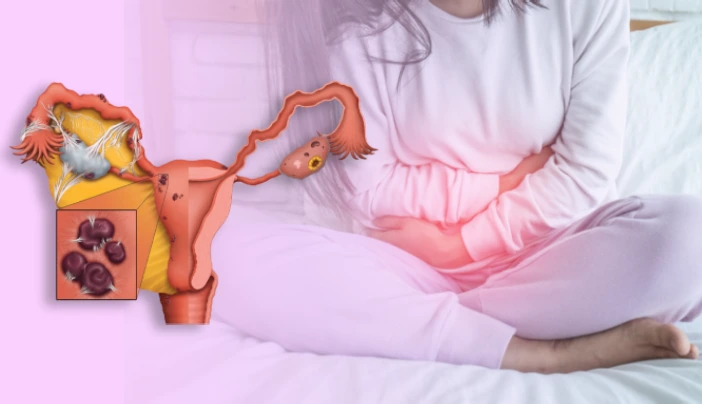Endometriosis is a significant health condition that occurs when tissue similar to the lining of the uterus, known as the endometrium, begins to grow outside the uterus. This abnormal growth can appear in various parts of the body, such as the pelvis, ovaries, or abdomen. Over time, these out-of-place cells can cause irritation, leading to the formation of scar-like tissue called adhesions, which can twist and pull organs into unnatural positions. This often results in intense pain and, in some cases, infertility.
Despite public figures like Shamita Shetty openly discussing their struggles with endometriosis and raising awareness about this often invisible disease, many people remain unaware of what endometriosis is and how profoundly it can impact individuals’ lives.
If you’re experiencing pain due to endometriosis, you’re likely seeking the most effective way to find relief. Like millions of other women — as many as 10% of women during their reproductive years are affected by endometriosis — you may be exploring your treatment options, including surgery. Although surgery might not be anyone’s first choice, it can sometimes be the most effective path to relief and improved quality of life.
For those looking for specialized care, finding the best Endometriosis Doctor in Sharjah can be crucial. This article will explore the different surgical options available for treating endometriosis, helping you understand when surgery might be necessary and what you can expect in your journey toward regaining control over your health and well-being.
Understanding Endometriosis:
Endometriosis is a widespread gynecological condition where tissue similar to the lining of the uterus, known as the endometrium, starts growing outside the uterus. This abnormal growth typically occurs on the ovaries, fallopian tubes, and the tissue lining the pelvis, and it can cause a range of symptoms including pelvic pain, heavy menstrual bleeding, and fertility challenges. Unlike the normal endometrial tissue that sheds during menstruation, this misplaced tissue remains in the body, leading to inflammation, the formation of painful cysts, and the development of scar tissue.
If you’re experiencing persistent pelvic pain or any of these symptoms, it’s important to consult a gynecologist who specializes in endometriosis and explore the best treatment options available in Dubai.
Symptoms to look for Endometriosis:
Severe menstrual cramps
- Long-term lower-back and pelvic pain
- Periods lasting longer than 7 days
- Heavy menstrual bleeding, where the pad or tampon needs changing every 1 to 2 hours
- Bowel and urinary problems including pain, diarrhea, constipation, and bloating
- Bloody stool or urine
- Nausea and vomiting
- Fatigue
- Pain during intercourse
- Spotting or bleeding between periods
Diagnosis of Endometriosis
Proper diagnosis often involves a thorough medical history, pelvic exams, and imaging tests. With over 150 million women affected by endometriosis globally, understanding and addressing this condition is key to maintaining a healthy and active life.
Non-Surgical Treatment Options
For managing endometriosis, several non-surgical treatments are available. These include:
- Pain Relief: Over-the-counter pain medications like NSAIDs can help reduce inflammation and alleviate pain.
- Hormone Therapy: Hormonal treatments, such as birth control pills or GnRH agonists, newer drugs like Dianogest can help regulate or even stop menstrual cycles, reducing the growth of endometrial tissue.
- Lifestyle Changes: Incorporating a balanced diet, regular exercise, and stress management techniques can support overall health and help manage symptoms.
- Medication: Medications can play a vital role in managing pain and controlling hormone levels, but it’s essential to weigh their benefits against potential side effects.
- While these non-surgical options can provide relief and are less invasive, they may not be effective for everyone and might not address the underlying cause of endometriosis.
Indicators That Surgery Might Be Necessary
Surgery for endometriosis may become necessary when severe pain becomes unmanageable, even with medication, and non-surgical treatments fail to provide relief. Persistent symptoms despite efforts such as hormone therapy or lifestyle changes can signal that more intervention is needed. Additionally, signs that endometriosis is worsening
— Like increasing pain or more frequent flare-ups
— Can indicate the condition’s progression.
Fertility issues are another crucial factor; if endometriosis is impacting your ability to conceive, surgical options may offer a better chance at improving fertility.
Consulting a specialist can help determine the right course of action.
Types of Endometriosis That Benefit Most from Surgery
Certain types of endometriosis are more likely to require surgical intervention for effective management.
👉🏻 Deep Infiltrating Endometriosis (DIE), which extends deeply into pelvic organs, often necessitates surgery to alleviate severe pain and prevent further complications.
👉🏻 Ovarian Endometriomas, or endometriosis-related cysts, can also require surgical removal, especially when they cause significant discomfort or hinder fertility.
Addressing these conditions surgically can provide substantial relief and improve overall quality of life.
Surgical Options for Endometriosis
Several surgical options are available for treating endometriosis:
👉🏻 Laparoscopy: This minimally invasive procedure involves using a small camera and instruments inserted through tiny incisions to remove or excise all the endometrial tissue. Remember, in endometriosis, the first surgery should be the best, as it helps extend the time between recurrences. Simply draining the endometriotic cyst will lead to a faster recurrence, which is why the removal of the cyst is the standard protocol.
👉🏻 Laparotomy: For more severe cases, this more invasive surgery involves a larger incision to access and treat the affected areas.
👉🏻 Hysterectomy: In cases where other treatments have failed, a hysterectomy (removal of the uterus) may be considered. This is typically a last resort and may also involve removing the ovaries.
Factors to Consider Before Opting for Surgery
Before deciding on surgery, consider the following factors:
- Severity of Symptoms: How significantly your symptoms affect your daily life.
- Age and Fertility: Your plans for future fertility and how surgery might impact them. Surgery will decrease the AMH levels to some extent but if left untreated the disease itself will lower the AMH level much more.
IVF treatment and ovum pick-ups are planned after an endometriotic cystectomy because performing the pick-up before surgery can sometimes lead to ovarian infections and severe complications.
- Overall Health: Your general health and any other medical conditions you may have.
- Previous Treatments: How well you’ve responded to non-surgical treatments.
A thorough evaluation by a specialist, such as an Indian Gynecologist in Dubai, can provide personalized advice and help guide your decision.
Benefits of Early Surgical Intervention
Opting for surgery early on can significantly benefit those with endometriosis. Addressing the condition before it progresses helps prevent further complications and can reduce the chances of recurrence.
Patients often experience a marked improvement in their quality of life, as surgery can alleviate chronic pain and other debilitating symptoms. For those hoping to conceive, early surgical intervention can enhance fertility outcomes, offering a better chance of successful pregnancy.
Life After Endometriosis Surgery
Post-surgery, you can expect:
- Recovery Time: Varies depending on the type of surgery; laparoscopy typically has a shorter recovery period compared to laparotomy.
- Pain Management: Pain management strategies and follow-up appointments will be necessary.
- Lifestyle Adjustments: Changes in diet, exercise, and stress management may support recovery and long-term health.
- Hormonal Treatment : If pregnancy is not being planned, hormonal treatment is prescribed for a few months to keep the disease in a quiescent state.
Find the Right Doctor for Endometriosis in Sharjah
Endometriosis can be a challenging condition, but you don’t have to face it alone. If you’re experiencing symptoms and wondering if surgery might be the right choice, reaching out to a specialist can make all the difference. Dr Neha Lalla, an experienced Indian gynecologist in Dubai, is here to help you explore your options and find the best path to relief. Take the first step towards a pain-free life by scheduling a consultation today. Together, we can create a treatment plan tailored just for you, so you can get back to enjoying the things you love.
Contact us now to learn more and start your journey to better health.
As you take the next steps in managing your health, don’t forget to empower yourself by asking the right questions. Check out our other blog, “5 Questions You Should Ask Your Gynecologist,” to make informed decisions about your health.


